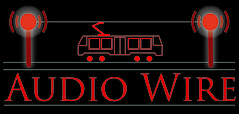Thursday, September 16, 2010
The Final Countdown!
Monday, May 17, 2010
The Discussion is Lacking
This exchange on Real Time with Bill Maher between Chris Matthews and Ross Douthat is the perfect example of why this country is so misinformed. While Chris goes on extolling the virtues of High Speed Rail, all you can hear Ross say is that Amtrak is heavily subsidized. No mention of highway subsidies or other market distortions, just the fact that Amtrak is government run. And no one really fights back. Never mind that most of the time it has to borrow tracks or has a higher operating recovery ratio than any other mode in this country.
Anyway, listen to the exchange and see how the country can be mislead so easily by people that don't discuss things with the facts. I always say this when I listen to people I think might be smart talk about a subject I know something about, but I need to remind myself that if they are this unintelligent about a subject I know about, how much do they know about things I don't know about, and what kind of misinformation am I getting on other subjects?
You can listen here before the flash uploads.
For some reason the embed feature wasn't working. The audio is still at the link above...
Tuesday, December 15, 2009
Detroit & Turin
After visiting Turin, it's quite astonishing to think that it once had so many issues. Everywhere my parents and I went was fairly exciting from the large public market to the Egyptian Museum second only to Egypt itself. From a superficial perspective it didn't seem any different from Milan which is the largest economic generator in Italy, ahead of Rome. But it seemed as if there was more for the Piedmont region to work with. It wasn't far from the alps for skiing and wasn't far from wine country either. With this in mind I feel as if Detroit has a lot more work to do than Turin might have had. And while some of the lessons such as using the skills you have to reinvent yourself are part of the toolbox, I feel there are a lot more tools that need to be built from scratch.
This post is also another opportunity to share pictures...
One of the original malls

Turin from the needle
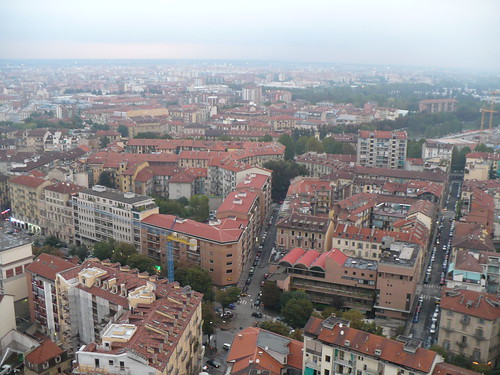
The largest outdoor market i've ever seen

The Superga
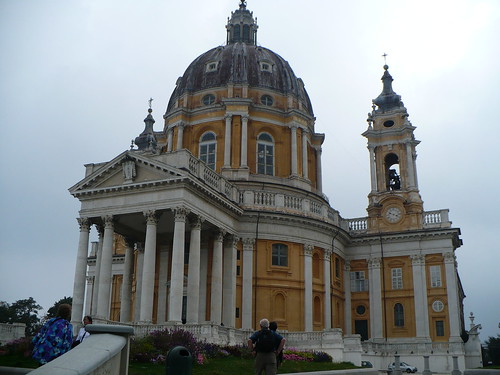
IGuido car sharing
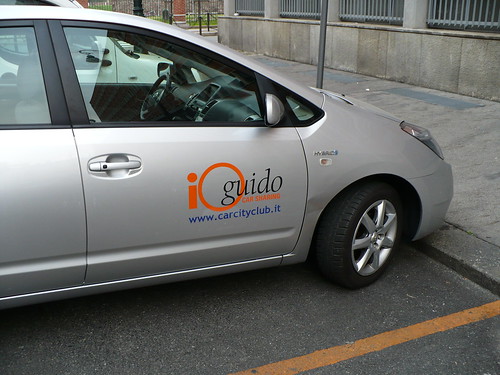
Buses and Arches

South of Turin is Wine and Food Country
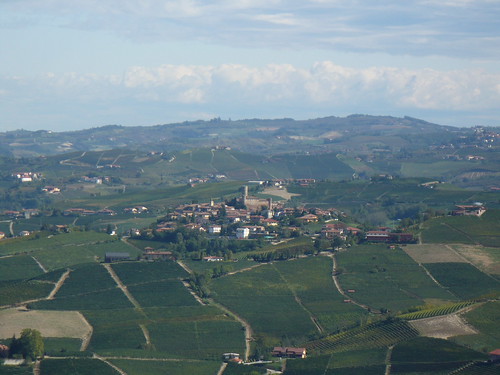
This is the town of Barolo for you wine lovers

Monday, November 30, 2009
Light Rail Kills Babies 2
But now the opponents are going with the next common denominator attack. If they build light rail, say they should have built BRT. If they built BRT they would be saying only use buses such as is happening in Oakland. This is at the time when UTA is actually building out a real transit network with all different transit modes including streetcars, light rail, BRT and bus networks.
"I don't think it's done any great favors to transit down here," said Salt Lake City resident Stephen Pace, who led the anti-rail group Utahns for Responsible Public Spending. He said UTA should have focused instead on buses that have the same right-of-way preference over cars as trains, but are more flexible and require a less massive investment.This is the ugly side of the mode wars where people who fight it don't think ANY money should be spent on transit, even if they say in public we should. It's not a nod to smart planning ideas but rather what is cheaper. It shows because these attacks come amongst vigorous transit expansion in all modes. It's also interesting that opponents are starting to attack the conservative credibility of UTA's leaders. A lot of the anti-tax folks are coming out to argue against any spending via taxes.
Pace rails against the "so-called" elected officials who champion fiscally conservative values but are "just as deep in the federal trough as anybody else" to fund TRAX extensions into their communities.It makes me wonder, what is fiscally conservative anyway in terms of development and infrastructure expansion? Is it doing nothing?
This is also happening in Tampa where anti-tax conservatives are starting to feel as if they were left behind by their elected officials who understand that infrastructure is better funded collectively. The polarizing effects of the national debates are starting to trickle down to pure ideologies.
How ironic that Republicans, one of whom I first supported over 20 years ago, and one who pledged never to impose new taxes when he came seeking my assistance in running his first campaign several years ago, would be the leading proponents of a new tax that could siphon as much as $300 million per year from the residents of Hillsborough County.What's even better is that the author of the Tampa article also believes that people have a choice whether to spend money on gasoline or not, even when they construction of the communities they live in are based on the automobile alone.
Sharpe writes that the proposed tax increase of $85 per person is "... less than the three-week price rise in the cost of gasoline." Perhaps. But the option of paying for gas is ours and not an imposed burden by our government.Funny that imposed burden.
Sunday, November 29, 2009
Infrastructure Spending
Another approach is to finance new projects several notches smaller in cost and boldness — and in contribution to economic growth. Denver and Salt Lake City, for example, are extending light rail and bus lines into the outlying suburbs, at a cost of less than $5 billion apiece.The Federal Government is a limited partner in these investments. For example while the Feds pay 90% of freeway expansion, more recent experience for these transit projects shows there is only a 50% match, and in more recent new starts reports that has been sliding down. Denver for example is asking for less than 40%.
With federal funds dwindling it also begs the question, if the Federal Government is not going to give regions funding for projects, why are regions sending the federal government any gas tax money? Sometimes it seems like a fairly inefficient funnel. Ultimately the MPO is the acting federal government at a regional level where there usually is no real governance. Since regions are the economic engines for the country, it makes a little sense but the federal government has too much power to tell regions what they can and can't spend money on.
But the benefits of having the federal funding mechanism dialed into the region is during a severe downturn. Ultimately that funnel can become a spigot pushing projects faster than they would normally go by providing jobs. In thinking about it this way, perhaps something they can do to help places like Denver or Salt Lake City is take over the capital funding for already under construction projects and allow those cities to use their existing capital money for operations or other projects. There are plenty of places that already have transit networks that could get pushed up if there were a guaranteed capital outlay.
I don't quite understand why the large goal oriented projects have stopped or are at least slowed. My only guess is that things have become so politicized and the no taxes groups have taken over the political landscape, making everyone else afraid to make a decision without getting hammered politically. Ultimately there needs to be a way to pay for needed infrastructure improvements, even outside of a crisis.
Thursday, October 1, 2009
Demand
Transportation Secretary Ray LaHood’s $1.5 billion discretionary grant pool won’t come anywhere close to meeting its requests, as states and other transport groups sent in applications for $56.9 billion to cover highway projects as well as transit, rail, seaport and other construction needs.
Friday, August 14, 2009
Building Something of Meaning
Under the stimulus, there is limited ability to build transit systems or major power generating facilities, upgrade water systems, or undertake significant environmental cleanups. While President Roosevelt built dams and President Eisenhower built an interstate highway system, President Obama's stimulus fills pot holes.
Monday, June 15, 2009
It's a Shame About Ray
It's not about car eradication. However I don't think everyone wants a car.
But if Americans increasingly get around by rail, bus and bicycle, as you’ve planned, who will be buying cars in the future? I think everybody will have an automobile. I think it’s amazing in America when you drive around and look at new homes that are being built, there are three-car garages. I don’t think you’re going to see families with three cars. I think you’re going to see families with one car, possibly two.We've built out our Interstate System, time to fix other things we've neglected:
So much of why we haven't done these things yet seems to stem from a culture of driving in America. Is that really changeable? We've spent three decades building an interstate system. We've put almost all of our resources into the interstate system. This is a transformational president, and the department is following the president's lead. People haven't really been thinking about these things. They have been thinking about how to build roads, how to build interstates, how to build bridges. People now are thinking differently about where they want to live, how they want to live, and how they want to be able to get around their communities.BTW, how are people liking the random music associations?
Tuesday, February 3, 2009
When Do We Get to Win?
Then you have people who are supposed to be allies voting against the bill. Landrieu of all people should know better after Katrina knocked out the New Orleans Streetcar system for months on end and put an abrupt stop to expansion of the Desire Line, for which funding had almost materialized before the storm.
And when President Obama "pledged to launch the biggest public works program since the construction of the interstate highway system in the 1950s" we didn't think you meant a whole new highway system. People want Infrastructure and not just roads. Republican pollsters even say they do. Rails, energy facilities, water treatment etc etc.
How about investing in operating transit? It has been conspicuously left out and as Brad Plummer mentions over at the Vine, Obama's team when asked why the infrastructure funding is so paltry, responds that they don't think we can spend it fast enough. I think its more something along the lines of this...
You can go ahead and tell yourself that this is just theory - just a single example. But that's willful ignorance, as the Hindrey scalping is only one chapter in what has been one long narrative arc whereby economic progressives have been deliberately shut out of top administration jobs. Just step back and think about it for a minute: Amid a stable of eminently qualified and well-respected progressives like James Galbraith, Joseph Stiglitz, Dean Baker, Robert Reich, Paul Krugman and Larry Mishel, Obama has chosen Rubin sycophants like Larry Summers and Tim Geithner to run the economy - the same Larry Summers who pushed the repeal of the Glass-Steagal Act, the same Geithner who masterminded the kleptocratic bank bailout, the same duo whose claim to fame is their personal connections to Rubin, a disgraced Citigroup executive at the center of the current meltdown. And the list of Rubin sycophants keeps getting longer, from Peter Orszag to Jason Furman.You can only have a circus when the clowns are in the building. And that includes the bearded ladies that think that the census is pork. But the bigger story here is that Obama's people only believe in pushing paper around instead of dirt.
But this all got me thinking, what would get people to pay attention? What would get people to start thinking about how important transit is in the major metropolitan areas and how a stimulus would work? How about we just pull an Ottawa and shut it all down. Imagine the signal that would send. Just stop running the buses and trains for one random unannounced day and see what happens. When all those Senate aids can't get to work or when bicycles start piling up outside the capital office buildings, perhaps some will take notice. When Denver shut down its system, the region was brought 30 minute delays and hellish parking scenarios downtown. When LA did it, traffic speeds declined 20%. Those are big numbers. Imagine them everywhere. Do you think people would finally notice?
I know i'm getting a bit more militant about this, but if we don't start seeing signs that things are actually going to change this year, it might be time to start trying something different than just voting for change. It's not like we're asking a lot more than is needed in this country. That comes during reauthorization. We're gonna have to change things ourselves. Anyone else getting tired of being not the permanent minority or majority, but permanently screwed?
Sunday, January 25, 2009
When You Ride Alone, You Ride With Larry?
The underlying problem is that helicoptering money to "consumers" by way of tax cuts or lump-sum grants a la last year's stimulus payments does little or nothing to help satisfy demands that are latent due to incomplete markets. Give me $100 and I can drive to Chicago for the day, not insignificantly because past public infrastructure spending built the roads from here to there. Give everyone in Madison $100 and it still does sod all for extending the Amtrak Hiawatha service, seeing as the city was cut off from such passenger rail network as still exists in the upper Midwest and reconnecting it requires a substantial investment. Maybe in libertarian fantasyland, there are no such things as collective action problems, but elsewhere overcoming them may be considered to be a useful function of government.As opponents like to say, 90% of people drive, well then we should spend 90% on roads. But its a cycle of spending that causes this to happen. As we've seen in places like Copenhagen, if you build infrastructure to support other modes such as cycling and transit, you will get more and more riders and shift the policies. This is what we did in the 50's in support of the automobile. It was a collective push to increase funding and regulations for that mode that led to its rise. At the time, many felt it was the way of the future, but looking back we know that was completely wrong.
But the issue with the stimulus that continues is the fact that we aren't doing enough and a lot of people don't seem to understand what is "enough". Calling $3 billion adequate is kind of lame, especially given the $250 billion in new projects that are in que as well as the thought that California's high speed rail line would be $40 itself. There is a want for a national high speed rail network, or at least start of work on the key city to city lines that would increase productivity and connectivity. And the excuse that it won't be started fast enough is based on existing FTA and DOT timelines in which transit is suffocated based on underfunding. Another excuse is that we should wait for the next transportation bill. But if we are able to make investments now and write a bill that can fold some of them in, why not do it?
While many will point to the New Deal as a major part of what got us out of the depression, the cap was World War II in which we turned auto plants into tank and plane manufacturers and people saved instead of continuing thier spending. No extra rubber around for new cars, only for the war effort. In fact, this poster reminds us of the lengths people took to save energy and resources. Imagine if in this time period of hardship people were asked to save a little more and come together to build or invest in more of what is needed such as education and technology.

If I were in charge, perhaps I would have an office of infrastructure reconciliation. This means bringing our rail infrastructure up to a current standard and increasing output dramatically, much like China. We'll have to also wait and see on the idea of an infrastructure bank but this is no time to comprimise or seek middle ground as Mr. Summers stated Obama will do. Tax cuts are an idea of the Republicans, thier solution to EVERYTHING over the last 30 years. After a while, there's not much left to cut. Look where that has gotten us. Seems like this is a time to strike forward with big thoughts and ideas.
Monday, December 1, 2008
Monday, This Is What We're Up Against
It seems crazy that a business like this could be going under right before demand could kick in.Based on Milwaukee's northwest side, the company makes rail cars for freight railroads and commuter rail systems.
"In the past few months, we have seen dramatic and unprecedented reductions and cancellations of orders by our customers in the freight locomotive, transit and transportation sectors of our business," the company's statement said. "Without substantial new orders, we cannot sustain the employees at the plant beyond the time frame outlined above."
Sunday, November 30, 2008
Framing Livable Communities: Density Terms
Not that this article from Raleigh Durham is a particularly bad one, but the headline "Raleigh Plan Picks Areas to Pack Growth" leads people to believe you're trying to force them to do something rather than giving alternatives to the single choice we currently have. We also know that focusing growth should be the true conservative point, due to the fact that actually saves money for cities and the people who live in them. Though it has been said that "density creates democrats". My hope is that when we make investments in our infrastructure including transit, that we make the decisions that save money for everyone and that includes smarter, denser growth. Growth that doesn't "pack us in".
Wednesday, November 19, 2008
Take a Walk Down To Electric Avenue
It’s hard to exaggerate how scattershot the current system is. Government agencies usually don’t even have to do a rigorous analysis of a project or how it would affect traffic and the environment, relative to its cost and to the alternatives — before deciding whether to proceed. In one recent survey of local officials, almost 80 percent said they had based their decisions largely on politics, while fewer than 20 percent cited a project’s potential benefits.This means most of those toll roads that she wants. It also means the sprawl roads that really have no environmental or fiscal benefits, such as the one we discussed yesterday. Yet Mary Peters still wants a cost benefit analysis done on projects. If it's the one that she's performing on the Central Corridor or the Dulles extension no thanks. We need better measures, and ones that put livability before driving fast or moving more cars.
But we also see articles like this, where the utilities are thinking about ordering electric cars. What the heck are you thinking? String up some wires on major corridors and order some buses that can be made fast. If they were so worried about making the shift to electric vehicles, they should start with modest changes now and public transport.
One interesting point the Journal piece gets into is that utilities want to play a much bigger role in managing the shift to electrified transport, to ensure that it doesn't put strain on the grid the way that the sudden burst in popularity of air conditioners did after World War II, taking the power industry by surprise.On trunk lines this would be cheaper for the transit agency and the electric company, not diesel makers, would be pulling in more money. I'm ashamed we have such tunnel vision.
Sunday, November 16, 2008
Pushing Problems Elsewhere
A Globe analysis of state highway data documents what many motorists have come to realize since the new Central Artery tunnels were completed: While the Big Dig achieved its goal of freeing up highway traffic downtown, the bottlenecks were only pushed outward, as more drivers jockey for the limited space on the major commuting routes.Let's keep building more freeways in urban centers. They seem to work so well.
Saturday, November 15, 2008
Transportmakers
Another should be looking into the possibility of building bus, light rail, and passenger train cars(including HSR). Now this might or might not be such a good idea seeing as the last time Boeing tried this the vehicles they created were lemons. But its worth exploring. If we want to think seriously about expanding transit capacity, we need to do something to speed up production. I have a feeling that siemens and other makers aren't going to be able to keep up with the demand that is coming.
But Mr. Udall recognized that the country could not afford the economic consequences of losing all of the automobile industry’s jobs and profits. He proposed that the auto companies branch out into “exciting new variants of ground transportation” to produce minibuses, “people movers,” urban mass transit and high-speed intercity trains. Instead of expanding the Interstate highway system, he suggested that the road construction industry take on “huge new programs to construct mass transit systems.” And he called for building “more compact, sensitively planned communities” rather than continuing urban sprawl.Glad he's thinking not just about the transport system but the land use that feeds it.
Senator Clinton Calls for Transit Investment
In a speech to the New York Public Transit Association, Clinton urged "bigger and bolder" transportation programs, including high-speed rail, and said modernizing the nation's transportation infrastructure and expanding transit will be a key issue for the next Congress and President-elect Barack Obama's incoming administration.
..."It takes too long and it costs too much to deliver transit projects," despite high and growing demand for more public transportation across the country, she said.
Noting that when President Dwight Eisenhower signed legislation authorizing the federal interstate highway system in 1956, the act launched the largest American public works program in history, Clinton said developing transit is a similar opportunity to leave a tangible legacy.
"Just as we built a 19th century transportation system with canals and railroads and we built a 20th century transportation system with highways, we now can build a 21st century transportation system with mass transit," she said.
More Stim
"Our transportation network has been the envy of the world, but we're starting to fall behind," warned Minnesota Rep. James Oberstar during the William O. Lipinski Symposium on Transportation Policy at Northwestern University in Evanston. The gloomy financial forecast is "all the more reason to invest in transportation infrastructure," said Oberstar, a Democrat who chairs the U.S. House Transportation and Infrastructure Committee. "Every billion invested in infrastructure means 34,000 jobs."
Rep. Jerry Costello, a downstate Democrat who heads up the House Subcommittee on Aviation, said the House will likely take up an economic stimulus package after Thanksgiving and added, "I've been assured that a large part of that will be for infrastructure."
Friday, November 14, 2008
A Green Deal
But not all government spending is created equal. Obama needs to pump serious cash into the economy in a way that promotes his long-term priorities. That means billions for energy-efficient and climate-friendly infrastructure like wind turbines, solar panels and mass transit, but nothing for new sprawl roads that ravage nature and promote gas-guzzling.He's right, water and other basic infrastructure is complicit in the growth as well as roads. Doing things that can focus future growth in sustainable ways should be on the top of the list. Arnold and others would do well to pay attention to this.
Wednesday, October 22, 2008
The Stakes of Stim
In Portland, city officials are already preparing lists of infrastructure projects they might launch with an infusion of federal money. It would be a nice silver lining for Portland if the economic crunch bought a refurbished bridge over the Willamette, or a streetcar extension.This would be a big boon for cities that have projects ready to go. As I said in an earlier post, it will be a huge deal for cities like LA and Seattle to pass their transit measures. Salt Lake City, Denver, Portland, and Houston already have a lot of engineering done for their new lines and if infused with stim, they could push that money to other transit projects to extend thier networks furthering the gap between them and those which are falling further behind.
If for instance Seattle drops the ball, it will be harder for them to seek stim money for projects that were rejected on a ballot measure. Though it might be a boon for thier streetcar infrastructure, regional transit might suffer from a crisis in confidence where opponents claim the win and the upper hand in cash direction. With the stakes so high for federal funding opportunity, it's important that these measures pass, else an opportunity that happens once in a century to double up on much needed transit capital spending could be lost.
Tuesday, October 21, 2008
The Earl of Transit
After years of defeats and futility, Blumenauer is convinced the odds are increasing that Congress could approve this investing as much as $50 billion to improve infrastructure with more next year if Obama is elected.I'm sure we'll see more discussion of this as we get closer to and after election day. Depending on who gets elected, it could break either way. I've already seen a number of opposition blogs and talkers posting an earlier post from the DOT's economist that was posted to Ma Peters blog. That post has also been discussed by Ryan as well. I remember when people were saying Gore and Bush were the same. Even though they were different, no one would make such a statement today with the current candidates and on issues like this.

